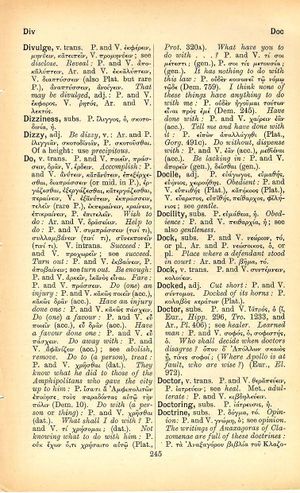do: Difference between revisions
(Woodhouse 2) |
(CSV4) |
||
| Line 1: | Line 1: | ||
{{ | {{Woodhouse1 | ||
| | |Text=[[File:woodhouse_245.jpg|thumb|link={{filepath:woodhouse_245.jpg}}]]'''v. trans.''' | ||
P. and V. ποιεῖν, πράσσειν, δρᾶν, V. ἔρδειν. | |||
<b class="b2">Accomplish</b>: P. and V. ἀνύτειν, κατανύτειν, ἐπεξέρχεσθαι, διαπράσσειν (or mid. in P.), ἐργάζεσθαι, ἐξεργάζεσθαι, κατεργάζεσθαι, περαίνειν, V. ἐξανύτειν, ἐκπράσσειν, τελεῖν (rare P.), ἐκπεραίνειν, κραίνειν, ἐπικραίνειν, P. ἐπιτελεῖν. | |||
<b class="b2">Wish to do</b>: Ar. and V. δρασείειν. | |||
<b class="b2">Help to do</b>: P. and V. συμπράσσειν (τινί τι), συλλαμβάνειν (τινί τι), συνεκπονεῖν (τινί τι). | |||
V. intrans. <b class="b2">succeed</b>: P. and V. προχωρεῖν; see [[succeed]]. | |||
<b class="b2">Turn out</b>: P. and V. ἐκβαίνειν, P. ἀποβαίνειν; see [[turn out]]. | |||
<b class="b2">Be enough</b>: P. and V. ἀρκεῖν, ἱκανὸς εἶναι. | |||
<b class="b2">Fire</b>: P. and V. πράσσειν. | |||
<b class="b2">Do</b> (<b class="b2">one</b>) <b class="b2">in injury</b>: P. and V. κακῶς ποιεῖν (acc.), κακῶς δρᾶν (acc.). | |||
<b class="b2">Have an injury done one</b>: P. and V. κακῶς πάσχειν. | |||
<b class="b2">Do</b> (<b class="b2">one</b>) <b class="b2">a favour</b>: P. and V. [[εὖ]] ποιεῖν (acc.), [[εὖ]] δρᾶν (acc.). | |||
<b class="b2">Have a favour done one</b>: P. and V. [[εὖ]] πάσχειν. | |||
<b class="b2">Do away with</b>: P. and V. [[ἀφανίζω|ἀφανίζειν]] (acc.); see [[abolish]], [[remove]]. | |||
<b class="b2">Do to</b> (<b class="b2">a person</b>), <b class="b2">treat</b>: P. and V. χρῆσθαι (dat.). | |||
<b class="b2">They know what he did to those of the Amphipolitans who gave the city up to him</b>: P. ἴσασι ἃ Ἀμφιπολιτῶν ἐποίησε. τοὺς παραδόντας αὐτῷ τὴν πόλιν (Dem. 10). | |||
<b class="b2">Do with</b> (<b class="b2">a person</b> or <b class="b2">thing</b>): P. and V. χρῆσθαι (dat.). | |||
<b class="b2">What shall I do with?</b> P. and V. τί χρήσομαι; (dat.). | |||
<b class="b2">Not knowing what to do with him</b>: P. οὐκ ἔχων ὅ, τι χρήσαιτο αὐτῷ (Plat., ''Prot.'' 320A). | |||
<b class="b2">What have you to do with</b> . . .? P. and V. τί σοι μέτεστι; (gen.), P. σοι τίς [[μετουσία]]; (gen.). | |||
<b class="b2">It has nothing to do with this law</b>: P. οὐδὲν κοινωνεῖ τῷ νόμῳ τῷδε (Dem. 759). | |||
<b class="b2">I think none of these things have anything to do with me</b>: P. οὐδὲν ἡγοῦμαι τούτων εἶναι πρὸς ἐμέ (Dem. 245). | |||
<b class="b2">Have done with</b>: P. and V. [[χαίρω|χαίρειν]] ἐᾶν (acc.). | |||
<b class="b2">Tell me and have done with it</b>: P. εἰπὼν ἀπαλλάγηθι (Plat., ''Gorg.'' 491C). | |||
<b class="b2">Do without, dispense with</b>: P. and V. ἐᾶν (acc.), μεθιέναι (acc.). | |||
<b class="b2">Be lacking in</b>: P. and V. ἀπορεῖν (gen.), δεῖσθαι (gen.). | |||
}} | }} | ||
Revision as of 09:38, 21 July 2017
English > Greek (Woodhouse)
v. trans.
P. and V. ποιεῖν, πράσσειν, δρᾶν, V. ἔρδειν. Accomplish: P. and V. ἀνύτειν, κατανύτειν, ἐπεξέρχεσθαι, διαπράσσειν (or mid. in P.), ἐργάζεσθαι, ἐξεργάζεσθαι, κατεργάζεσθαι, περαίνειν, V. ἐξανύτειν, ἐκπράσσειν, τελεῖν (rare P.), ἐκπεραίνειν, κραίνειν, ἐπικραίνειν, P. ἐπιτελεῖν. Wish to do: Ar. and V. δρασείειν. Help to do: P. and V. συμπράσσειν (τινί τι), συλλαμβάνειν (τινί τι), συνεκπονεῖν (τινί τι). V. intrans. succeed: P. and V. προχωρεῖν; see succeed. Turn out: P. and V. ἐκβαίνειν, P. ἀποβαίνειν; see turn out. Be enough: P. and V. ἀρκεῖν, ἱκανὸς εἶναι. Fire: P. and V. πράσσειν. Do (one) in injury: P. and V. κακῶς ποιεῖν (acc.), κακῶς δρᾶν (acc.). Have an injury done one: P. and V. κακῶς πάσχειν. Do (one) a favour: P. and V. εὖ ποιεῖν (acc.), εὖ δρᾶν (acc.). Have a favour done one: P. and V. εὖ πάσχειν. Do away with: P. and V. ἀφανίζειν (acc.); see abolish, remove. Do to (a person), treat: P. and V. χρῆσθαι (dat.). They know what he did to those of the Amphipolitans who gave the city up to him: P. ἴσασι ἃ Ἀμφιπολιτῶν ἐποίησε. τοὺς παραδόντας αὐτῷ τὴν πόλιν (Dem. 10). Do with (a person or thing): P. and V. χρῆσθαι (dat.). What shall I do with? P. and V. τί χρήσομαι; (dat.). Not knowing what to do with him: P. οὐκ ἔχων ὅ, τι χρήσαιτο αὐτῷ (Plat., Prot. 320A). What have you to do with . . .? P. and V. τί σοι μέτεστι; (gen.), P. σοι τίς μετουσία; (gen.). It has nothing to do with this law: P. οὐδὲν κοινωνεῖ τῷ νόμῳ τῷδε (Dem. 759). I think none of these things have anything to do with me: P. οὐδὲν ἡγοῦμαι τούτων εἶναι πρὸς ἐμέ (Dem. 245). Have done with: P. and V. χαίρειν ἐᾶν (acc.). Tell me and have done with it: P. εἰπὼν ἀπαλλάγηθι (Plat., Gorg. 491C). Do without, dispense with: P. and V. ἐᾶν (acc.), μεθιέναι (acc.). Be lacking in: P. and V. ἀπορεῖν (gen.), δεῖσθαι (gen.).

